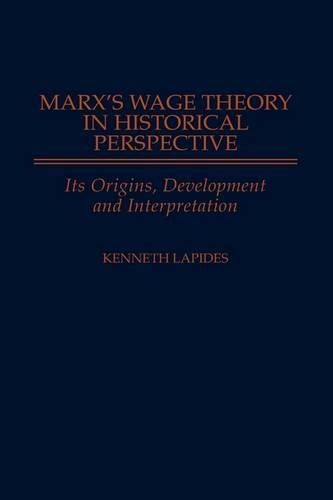
Marx's Wage Theory in Historical Perspective: Its Origins, Development, and Interpretation
(Hardback)
Publishing Details
Marx's Wage Theory in Historical Perspective: Its Origins, Development, and Interpretation
By (Author) Kenneth Lapides
Bloomsbury Publishing PLC
Praeger Publishers Inc
18th June 1998
United States
Classifications
Tertiary Education
Non Fiction
Left-of-centre democratic ideologies and movements
Economic theory and philosophy
Labour / income economics
Sociology: work and labour
Far-left political ideologies and movements
335.4
Physical Properties
Hardback
288
Description
To fully grasp Marx's theory of the labour movement, Lapides supplies a deeper insight into the economic analysis underlying it. This book presents Marx's theory of wages and wage labour, previously scattered throughout his writings, in its entirety. The author places the theory in its historical context, locating the sources of Marx's wage theory, its intellectual antecedents and the roots of later controversies, but the primary focus of the work is the actual development of Marx's theory in the words in which he expressed it. In order to reveal the true nature and rich texture of Marx's thought, the author has assembled Marx's own formulations, scattered throughout his numerous works and buried beneath mountains of commentary and criticism. The book provides a faithful record of the complete evolutionary progress of Marx's theory.
Reviews
.,."the first-ever full, consolidated statement of Marx's wage theory....Kenneth Lapides's book makes an outstanding contribution....read this book....a boon for unfolding labor and community struggles."-Labor Studies Journal
.,."Lapides has done a commendable job in bringing together a vast array of material on the subject under one cover. Any student of the subject will greatly benefit from acquanting him/herself with this book early on."-Review of Radical Political Economics
"This book under-takes that task both meticulously and clearly. It thus becomes an important contribution to the history of economic thought....Lapides' book is a major contribution to the history of economic thought....All these approaches are analyzzed with detailed documentation from original sources....[e]very other reader will enjoy similar understanding from different parts of the work. Therefore this is a book to be read and to be savored. It traces the development of one aspect of Marx's economic analysis, whilst, in so doing, it illuminate many contemporary economic problems."-Labor History
...the first-ever full, consolidated statement of Marx's wage theory....Kenneth Lapides's book makes an outstanding contribution....read this book....a boon for unfolding labor and community struggles.-Labor Studies Journal
...Lapides has done a commendable job in bringing together a vast array of material on the subject under one cover. Any student of the subject will greatly benefit from acquanting him/herself with this book early on.-Review of Radical Political Economics
Kenneth Lapides's book addresses itself to Marx's wage theory, and, as a measure of its success, it both enhances our understanding of the core elements of Marx's economic theory, and facilitates the appropriate situating of Marx in the pantheon of economic theorists.-Labour/Le Travail
Lapide's book is a major contribution to the history of economic thought. It covers long-forgotten ground, by providing a comprehensive account of the initial phase of wage theory, of the essentials of the wage-fund doctrine and of its critiques, both from within the political economy and from external radical sources. All these approahces are analyzed with detailed documentation from original sources. This reviewer gained particular insights from the detailed survey of the Ricardian Socialists, yet every other reader will enjoy similar understandings from different parts of the work. Therefore this is a book to be read and to be savored. It traces the development of one aspect of Marx's economic analysis, whilst, in so doing, it illuminates many contemporary economic problems.-Labor History
This book under-takes that task both meticulously and clearly. It thus becomes an important contribution to the history of economic thought....Lapides' book is a major contribution to the history of economic thought....All these approaches are analyzzed with detailed documentation from original sources....[e]very other reader will enjoy similar understanding from different parts of the work. Therefore this is a book to be read and to be savored. It traces the development of one aspect of Marx's economic analysis, whilst, in so doing, it illuminate many contemporary economic problems.-Labor History
..."the first-ever full, consolidated statement of Marx's wage theory....Kenneth Lapides's book makes an outstanding contribution....read this book....a boon for unfolding labor and community struggles."-Labor Studies Journal
..."Lapides has done a commendable job in bringing together a vast array of material on the subject under one cover. Any student of the subject will greatly benefit from acquanting him/herself with this book early on."-Review of Radical Political Economics
"Kenneth Lapides's book addresses itself to Marx's wage theory, and, as a measure of its success, it both enhances our understanding of the core elements of Marx's economic theory, and facilitates the appropriate situating of Marx in the pantheon of economic theorists."-Labour/Le Travail
"Lapide's book is a major contribution to the history of economic thought. It covers long-forgotten ground, by providing a comprehensive account of the initial phase of wage theory, of the essentials of the wage-fund doctrine and of its critiques, both from within the political economy and from external radical sources. All these approahces are analyzed with detailed documentation from original sources. This reviewer gained particular insights from the detailed survey of the Ricardian Socialists, yet every other reader will enjoy similar understandings from different parts of the work. Therefore this is a book to be read and to be savored. It traces the development of one aspect of Marx's economic analysis, whilst, in so doing, it illuminates many contemporary economic problems."-Labor History
Author Bio
KENNETH LAPIDES is an independent researcher and free-lance writer. He is the editor of Marx and Engels on the Trade Unions (Praeger, 1986).
